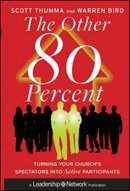Advent a make-or-break chance for churches, visitors
WASHINGTON (RNS)—Deck the halls and cue the pageant! The weeks before Christmas mark a time in American churches when the lapsed and the curious who seldom darken the door just might drop by for a taste of the season's spirit.
But if visitors briskly come and go without considering a commitment to join or get involved, then churches will have missed a golden opportunity with huge implications for the future.

Attendance tends to increase at worship services for the four weeks of Advent, but new attendees often don't see or feel what makes others stay involved year-round.
|
Part of what's at stake, researchers say, is the survival of congregations. Unless they start engaging the types of people who visit only at the holidays, aging mainline churches will have virtually no one in them in 30 years, according to Scott Thumma, a sociologist of religion at Hartford Seminary. Evangelical congregations, too, are in many cases poised to face a similar fate.
"If you just have the Advent season without also calling people to a more significant, disciplined sense of what the Christian life is, then you run the risk of letting people come in once a year and feel that they've done their Christian duty," said Thumma, author of The Other 80 Percent: Turning Your Church's Spectators into Active Participants.
The Christmas season is when Americans are most open to considering matters of faith, according to data from LifeWay Research, a Southern Baptist research firm. In a 2008 survey, 47 percent said they've been more open during the holidays. That's more than after a national crisis such as 9/11 (38 percent), after a natural disaster (34 percent) or the birth of a child (28 percent).
Attendance tends to increase at worship services for the four weeks of Advent, according to Thumma. But new attendees often don't see or feel what makes others stay involved year-round.

|

Scott Thumma
|
"When we get caught up in all the celebration and don't take time to think about communication, we miss a big point of the Christmas season," said LifeWay Research President Ed Stetzer. "I would grade churches a C or a D on this. A lot of churches just go through the motions and assume people will come."
This year, new initiatives are courting those who've wandered from the flock. Some call them the "Chreasters" — people who rarely show up beyond Christmas and Easter.
The Catholics Come Home project is for the first time running a $3.5 million TV campaign nationwide. CCH is also launching new local campaigns in St. Louis, Tampa and Fort Wayne, Ind. The Episcopal Church is running an online Advent greeting in which a young adult woman waxes nostalgic about holidays spent in church and invites everyone to services.
The challenge for congregations, however, involves breaking old habits and learning new ones during what is already a busy, demanding time of year.
"Special efforts (to engage inactive members and seekers) are not likely to occur during the Christmas season," said Alan Newton, executive minister for the American Baptist Churches in and around Rochester, N.Y. "It is a busy season with lots of charitable work, extra visiting of shut-ins and the like, (plus) extra services. A lot of the regulars travel on holidays, making extra efforts challenging."
Despite the difficulties, churches are finding ways to turn holiday activities into forums where people with tenuous or nominal ties to a faith community can explore deeper ones. Approaches vary widely, but all tend to give visitors a taste (or a reminder) of what's meaningful about church commitments.
Sometimes the focus is on a few individuals. At Our Saviour's Atonement Lutheran Church in New York, ministry associate Jacob Simpson said he struggles to get consistent participation from the six teenagers in his confirmation group.
But at Advent, he could ask a new question: how would you like to help your neediest neighbors? Their answer: with a winter clothing drive and volunteering at a soup kitchen. Based on their excitement for projects of their own design, he expects close to full participation.
"Kids don't understand why they should be coming to church, and churches often don't give kids enough to do," Simpson said. "We can be honest with them that this world is not perfect, and we're called to do something about it."
At worship services and special events, churchgoers need to remember the welcoming and non-judgmental father from the parable of the prodigal son, Thumma said. His tip: remind greeters to avoid comments like, "Where have you been? We haven't seen you in ages!" Stick instead with, "It's great to see you! How are things going? Come see what's happening here … "
Another tip: create environments where newcomers and inactive members can see and hear what makes church life meaningful. This might be a rolling video or a brief presentation during a reception. It could be a hallway lined with photos from mission trips, boys and men shoveling out elders after snowstorms, and other highlights of the year.
"It seems like a perfect occasion for the pastor or some religious leader to say, 'It wasn't just the shepherds or the wise men back then'" who were giving, Thumma said. '"We have people who're giving all year round in this community.'"